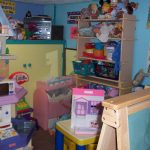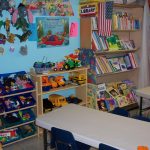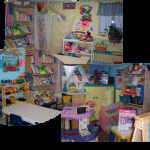This past summer the Illinois Department of Children and Family Services (our licensing agency) instituted a new rule requiring licensed childcare facilities to create a behavior support plan for any child with behavior issues. In conjunction with the child’s parents, the facility will construct a plan to improve the child’s behavior and outline support for both the child and family. The goal is to improve behavior without the disruption of changing programs.
In years past when a child was repeatedly disruptive the administrators would remove the child. Parents then needed to scramble to find another daycare. Childcare facilities did this to keep order in the classroom, allowing teachers to evenly spend time with the children in their care. This was also done to protect the other children when a physically aggressive child was present. To be honest many providers did this to also protect the adults. There are many horror stories of childcare personnel being accused of restraining children improperly or not properly supervising an aggressive child when another child got hurt. (To be honest we all see reports of unprofessional care givers and teachers who were accused properly and at fault. We really hope those people are far and few between and out of the childcare profession).
Now before any child is removed from care by the facility there must be a behavior support plan in place and has failed to work. There must also be a transition plan created by the facility and parents. This is to give the parents resources to help ease the troubled child into a new facility. We think these new requirements are a positive move to help those children with behavior issues and the families who are just trying to make it all work.
You should also know if you will be removing your child from any childcare facility, they are required to have you write a note stating the reason why you are removing your child. All childcare facilities are required to compile that information and report it to the state once a year.
BY MATTHEW LYNCHJULY 17, 202222450
Spread the love
Simplified activities that can assist in the improvement of your kid’s cognitive developmentfrom birth to age five are highlighted below:
Birth to 1 Year
- Books, especially those with bright contrasting colors and patterns with relatable images, should be read to your baby.
- Sing simplified and rhythmic songs. Classical music should be often played, and toys that make interesting sounds must always be around the child.
- Hang up mirrors or cards that can be reached out to and looked upon by your baby.
- By observing a baby’s gestures intently, you can learn a lot. Be attentive to them, and talk to them often.
- As you carry your baby during outings or when around the house, narrate to them your actions.
- Allow them to move around and have some “tummy time.”
- Permit your baby to explore different textures.
- Use physical touch and body massages. (Studies reveal that physical touch aids in brain development for babies)
- Play simple games with the baby. An example is “Peek-A-Boo.”
1 Year to 2 Years
- Recite, rehearse and sing songs and or nursery rhymes that integrate body motions, like “Itsy Bitsy Spider.”
- Play a variety of games continually. Use building blocks, or, once your child has enough understanding, play games like “Hide and Seek.”
- Allow your toddler to assist with simple household tasks. Assist your child in learning about sorting, organizing, and categorizing, using objects such as toys.
- Make age-appropriate, simple, logical, and consistent rules and enforce them with positive discipline.
- Develop simple routines with your child.
- Provide your child with sensory experiences with messy materials like sand, mud, and water. You must strictly supervise these experiences.
- Take note of noises your child hears throughout the day.
- Sing the ABCs with the child.
- Make use of shapes, colors, and counting in everyday contexts.
3 Years to 5 Years
- Provide simple choices with two options to your child. You could ask the child something like, “What would you rather eat, waffles or pancakes for breakfast?”
- Throw simple questions at your child. For instance, show the child a couple of toys and which one he would like to play with first. Or, after crossing the street, stop and ask why we look both ways before crossing the street.
- Visit places that can arouse the child’s interest, like an aquarium, library, or children’s museum. Pay apt attention to the curious questions of your child, including their actions, reactions, and responses when you ask them questions.
- Engage your child in simple board games or puzzles early enough.
- Encourage your kid’s imagination and creativity.
- Get your child involved in symbolic play and pretend play.
- Continually read aloud to your child and introduce thought-provoking questions using books.
- Enjoin your child to reflect on their thinking and learning. You can ask them questions like, “What’s something new that you learned?” “Can you do this?” after reading a book or returning from school?
Although these activities are simple and pretty easy to implement, they are guaranteed to surely help boost your kid’s brainpower.
Early childhood is the most important time for brain development. It sets the stage for the rest of the child’s life.Parents and caregivers must focus their attention on early learning skills and providing the child with rich immersive experiences. Growing as many brain synapses as possible is the goal.
Every touch, speech, or motor experience is important! Let them explore and learn. That’s what we do everyday with the children in our care. Explore and play is vital in a child’s life. A child learning how to navigate play relationships with their peers is as important as school style learning.
Getting a child ready for kindergarten must include play, and how to socialize with others. Of course letters, numbers, shapes and colors are equally important. The rich immersive experiences that include everything will grow brain synapsis throughout a child’s life.
Thank you for putting up with an unfinished web site for the past 8 weeks. I decided to move the day care website to WordPress and there is a much steeper learning curve than I anticipated. I’m only able to work on it at night and on weekends but I hope to add more as time goes on.
Category: Information










